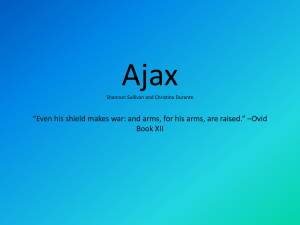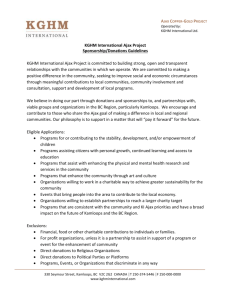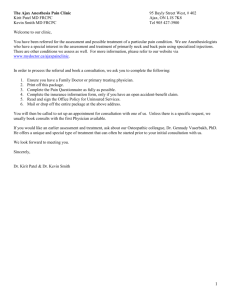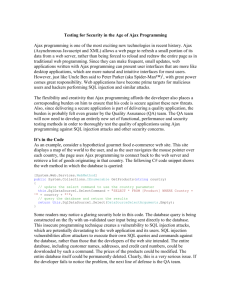Study guide for Ajax, by Sophocles Part 1 – Cell 1 – Athena and
advertisement
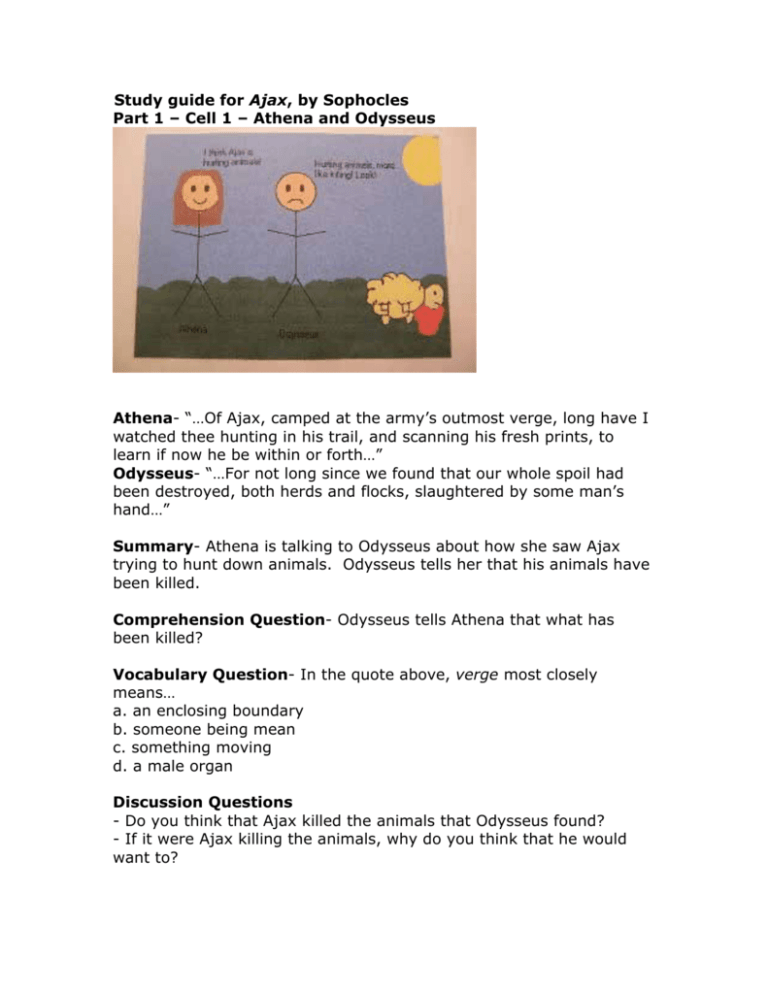
Study guide for Ajax, by Sophocles Part 1 – Cell 1 – Athena and Odysseus Athena- “…Of Ajax, camped at the army’s outmost verge, long have I watched thee hunting in his trail, and scanning his fresh prints, to learn if now he be within or forth…” Odysseus- “…For not long since we found that our whole spoil had been destroyed, both herds and flocks, slaughtered by some man’s hand…” Summary- Athena is talking to Odysseus about how she saw Ajax trying to hunt down animals. Odysseus tells her that his animals have been killed. Comprehension Question- Odysseus tells Athena that what has been killed? Vocabulary Question- In the quote above, verge most closely means… a. an enclosing boundary b. someone being mean c. something moving d. a male organ Discussion Questions - Do you think that Ajax killed the animals that Odysseus found? - If it were Ajax killing the animals, why do you think that he would want to? Cell 2 – Athena and Odysseus Athena- “By night he [Ajax] meant to steal you alone.” Odysseus- “Did he come near us? Did he reach his goal?” Athena- “He stood already at the two chiefs’ doors.” Odysseus- “What then withheld his eager hand from bloodshed?” Summary- Athena tells Odysseus that Ajax came to take him but didn’t. Odysseus then asks Athena why he didn’t. Comprehension Question- Who was going to take Odysseus but didn’t? Vocabulary Question- In the quote above, withheld most closely means… a. went for b. took c. restrained e. received Discussion Questions - Why do you think that Ajax came to take Odysseus? - Why do you think Ajax didn’t follow through with his plan? Cell 3 – Athena and Odysseus Athena- “’Twas I restrained him, casting on his eyes o’ermastering notions of that baneful ecstasy that turned his rage on flocks and mingled droves of booty yet unshared, guarded by herdsmen. Then plunging amid the thronging horns he slew smiting on all sides; and one while he fancied the Atreidae were the captives he was slaughtering…” “…he bound with thongs such oxen as yet lived, with all the sheep, and drove them to his tents, as though his spoil were men, not horned cattle. Now lashed together in the hut he tortures them. But to thee too will I expose this madness, that seeing thou mayst proclaim it to all the Greeks.” Summary- Athena tells Odysseus that she saw Ajax taking oxen and sheep into a tent. He lashed at the animals with his thong, torturing them. Athena then tells Odysseus that she is going to say what Ajax did to all the Greeks. Comprehension Question- What kind of animals was Ajax hurting? Why was Ajax hurting animals? Vocabulary Question- In the quote above, herdsmen most closely means… a. an owner of livestock b. a person who herds men c. a person who heard animals d. all of the above Discussion Questions - Now that we know that Ajax killed the animals, why do you think he did? - Do you think that Athena should tell all the Greeks about what Ajax did? Cell 4 – Athena and Odysseus Odysseus- “What dost thou, Athena? Do not summon him forth.” Athena- “Abide in silence. Earn not the name of coward.” Odysseus- “Nay, by the Gods, let him remain within.” Summary- Athena summons Ajax and Odysseus doesn’t want her to. Athena tells Odysseus to remain calm don’t say a word. Comprehension Question- Who does Athena summons? Vocabulary Question- In the above quote, abide most closely means… a. don’t listen to b. to put up with c. listen to d. to not put up with Discussion Question - Why do you think that Odysseus doesn’t want Athena to summon Ajax? - Why do you think that Athena tells Odysseus to remain calm and don’t say a word? Cell 5 – Athena and Odysseus Athena- “What dost thou dread? Was he not once a man?” Odysseus- “Yes, and to me a foeman, and still it.” Athena- “To mock foes, is not that the sweetest mockery?” Summary- Athena asks Odysseus why he doesn’t want Ajax to come. Odysseus says that he is an enemy. Athena then tells Odysseus that it is fun to make fun of your enemies. Comprehension Question- Why doesn’t Odysseus want Ajax to come? Vocabulary Question- In the quote above, foeman most closely means… a. a foreman b. a float c. an enemy d. a warrior Discussion Questions - Why do you think that Ajax is Odysseus’ enemy? - Why do you think that Athena tells Odysseus that it is fun to make fun of your enemies? Cell 6 – Athena and Odysseus Athena- “Even now he shall not see thee, near as thou art.” Odysseus- “How so, if still with the same eyes he sees?” Athena- Stand then silent, abiding as thou art.” Odysseus- Stay I must; yet I fain would be far hence.” Summary- Odysseus is worried that when Ajax comes he is going to see him. Athena tells him that he won’t and that all Odysseus has to do it stay silent. Comprehension Question- Who is worried about Ajax’s seeing him? Vocabulary Question- In the quote above, hence most closely means… a. imagine where b. from there c. from here d. for a reason scared Discussion Questions - What do you think will happen if Ajax does see Odysseus? - Do you think that Odysseus trusts Athena enough to know that Ajax won’t see him? Cell 7 – Athena and Ajax Athena- “Ho, Ajax! Once again I summon thee. So slight is they regard for thine ally?” Ajax- “Oh hail, Athena! Hail thou Zeus-born maid! Nobly hast thou stood by me. Now will I crown thee with trophies all of gold for this right conquest.” Athena- “They words are welcome. But now tell me this: hast thou dyed well thy sword in the Argive host?” Summary- Ajax walks into the scene, and Athena greets Ajax. They both compliment each other. Comprehension Question- Who walks into the scene? Vocabulary Question- In the quote above, conquest most closely means… a. a quest that needs to be fulfilled b. conquering, victory c. invasion d. fight Discussion Question - Do you think that Ajax is a nice person from what you have heard about him so far? - Why do you think Athena is talking to Ajax? Cell 8 – Athena and Ajax Athena- “’Tis well. And what then of Laertes’ son? In what plight does he stand? Or has he escaped thee?” Ajax- “Wouldst thou know where is that accursed fox?” Athena- “Even so-Odysseus, thine old adversary.” Ajax- “Goddess, a most dear captive in my tent he sits. I do not mean him to die yet.” Summary- Athena asks Ajax if he knows where Odysseus is even though she already knows. Ajax tells Athena that Odysseus is in his tent (which is so not true). Comprehension Question- Who does Athena ask when she wants to know where Odysseus is? Vocabulary Question- In the quote above, adversary most closely means… a. friend b. advisor c. enemy e. king Discussion Questions - Why do you think that Ajax is falsely telling Athena about Odysseus’ being in his tent? - Why is Athena asked Ajax if he knows where Odysseus is? Cell 9 – Athena and Ajax Athena- “What evil wilt thou inflict on the poor wretch?” Ajax- “His back the scourge must crimson ere he dies.” Athena- “Nay, do no torture so the wretched man.” Summary- Athena ask Ajax how much torture he will inflict on Odysseus. He says that he will hit his back enough times to the point where his back bleeds. Athena then tells him to not torture him. Comprehension Question- How many times is Ajax going to hit Odysseus’s back? Vocabulary Question- In the quote above, crimson most closely means… a. the crimson chin of time b. blue/green with envy c. purple/red with blood d. orange/yellow with jaundice Discussion Question - Why does Ajax want to inflict so much pain on Odysseus? - Why do you think that Athena tells Ajax not to torture Odysseus so much when she know that Odysseus is near her and not it Ajax’s tent? Cell 10 – Athena and Odysseus Odysseus- “I know none nobler; and I pity him in his misery, albeit he is my foe, since he is yoked fast to an evil doom. My own lot I regard no less that his. For I see well nought else are we but mere phantoms, all we that live, mere fleeting shadows.” Athena- “Warned therefore by his fate, never do thou thyself utter proud words against the gods; nor swell with insolence, if thou shouldst vanquish some rival by main strength or by wealth’s power. For a day can bring all mortal greatness low, and a day can lift it up. But the gods love the wise of the heart, the froward they abhor. Summary- Odysseus is basically saying that he hates Ajax and Athena is saying that she warned him. Comprehension Question- Who does Odysseus hate? Vocabulary Question- In the quote above, utter most closely means… a. speak b. milk a cow c. make butter d. a cow’s body part Discussion Questions - Why does Odysseus hate Ajax? - What does Athena mean when she says that she is warning him? Part 2 - Cell 1 “ATHENA Seest thou, Odysseus, how great the strength of gods?” Athena tells Odysseus Do you see Odysseus the power/strength of the gods? In the quote above Seest most likely means… A) Smell that thing B) Do see C) Thought of touch D) Heard a beast What do you think would happen if Odysseus answers No that he does not see the strength/power of the gods? What does Athena ask Odysseus? If someone were to use this quote as a way to prove something how do you think they would use it? Cell 2 Odysseus Athena “ODYSSEUS I know none nobler; and I pity him In his misery, albeit he is my foe, Since he is yoked fast to an evil doom. My own lot I regard no less than his. For I see well, nought else are we but mere Phantoms, all we that live, mere fleeting shadows.” This Quote is when Odysseus is talking to Athena about Ajax. Athena Asks him if he could not find a more courageous man than Ajax Odysseus answers by saying I know no one as noble as him but he is still my foe and he is stuck to an evil doom. "I know none nobler; and I pity him In his misery, albeit he is my foe..." In this quote what does albeit mean? A) Conceding a fact B) False-hearted friend C) Even though D) Wrongly accused Do you think Odysseus is telling the truth about his not knowing anyone much nobler than Ajax? Who are Odysseus and Athena talking about? Do you think it is ethically correct for Odysseus to call Ajax his Foe? Cell 3 Chorus “Son of Telamon, lord of Salamis' isle, On its wave-washed throne mid the breaking sea, I rejoice when fair are thy fortunes: But whene'er thou art smitten by the stroke of Zeus, Or the vehement blame of the fierce-tongued Greeks, Then sore am I grieved, and for fear I quake, As a fluttering dove with a scared eye.” This quote is about the chorus singing about the son of Telamon also goes by the name of Ajax. They say Ajax king of Salamis on the throne in the middle of the sea I am glad when goodness are fortunes but when you are killed by Zeus or the enraged blame of the Greeks then I am sad and I’m scared as a dove with an eye with a scar. What does vehement most closely mean in the quote above? A) Happy B) Sad C) Enraged D) Weird How do you think the Chorus knows that Ajax will die because of Zeus? What do you think Ajax would do if he were to hear what the chorus is singing? What would you do if you were talking to somebody and then a chorus starts singing about a persons life? Cell 4 Chorus “Of such misdeeds, no faith would he win. 'Tis the stronger whom creeping jealousy strikes. Yet small men reft of help from the mighty Can ill be trusted to guard their walls. Best prosper the lowly in league with the great; And the great have need to be served by the less. But none to the knowledge of such plain truths May lead minds witless and froward. Even such are the men who murmur against thee: And vainly without thine aid, O King, We strive to repel their accusing hate.” The chorus keeps on singing about Ajax. They say of all the bad things no faith would he get. Creeping Jealousy is much stronger, yet weak men take help from the strong, from the ones who can be badly trusted to trust their defenses. Then they say we make an effort to keep away their accusations of hatred. In this quote Strive most closely means… A) Struggle B) Eat C) Play D) Hate What do you think Athena and Odysseus would think about what the chorus is singing about if they were to hear it? What do you think the chorus is singing about? What kind of Misdeeds do you think the chorus is singing about? Part 3 - Cell #1: Tecmessa tells the story “Hereof in the tent may proof be seen; sword-slain victims in their own blood bathed, by his hand sacrificially slaughtered.” –Tecmessa Summary: Tecmessa, Ajax’s concubine/wife, comes on stage and begins to tell the story of how Ajax, in a fit of insanity, brought a herd of sheep into his and Tecmessa’s tent and violently killed all the sheep. Reading Comprehension Question: According to the quote, where does Tecmessa have proof for her story? Vocabulary Question: In the quote above, what does the word slaughtered most closely mean? a) worshiped b) saved c) killed d) honored Predictive Question: Will Tecmessa explain why Ajax killed the sheep? Associative Question: How does Tecmessa feel about Ajax’s going insane? How would you feel if one of your family members started to go insane? How does our society treat the mentally ill? Cell #2: Violent details “…sliced off from the one both the head and the tongue, and flings them away; but the other upright to a pillar he binds, then seizing a heavy horse-harnessing thong he smites with the whistling doubled lash…” –Tecmessa Summary: Tecmessa gives details on exactly how Ajax slaughtered some of the sheep (slicing off heads, whipping, etc.) Reading Comprehension Question: What are two ways that Ajax killed the sheep? Vocabulary Question: In the quote above, the word smites most closely means… a) strikes b) kisses c) walks d) brushes Ethical Question: Is it morally right to kill an animal in such a violent way? Literary Question: How does the imagery used in the quote help convey a specific feeling? What is that feeling? Cell #3: Ajax’s plight “His rage dies down like a fierce south-wind. But now, grown sane, new misery is his…” –Tecmessa Summary: Tecmessa tells the audience that when Ajax was crazy and killing sheep, he didn’t realize how terrible his actions were. Now, he is starting to come back to normal. As he comes back to normal, though, he understands his actions and he becomes miserable again. Reading Comprehension Question: Is Ajax still in a rage? Vocabulary Question: What does the word sane most nearly mean? a) handsome b) intelligent c) brave d) mentally healthy Ethical Question: Is it right for Ajax to take out his anger on a herd of sheep? Associative Question: In other plays, how do characters deal with their anger? Are their methods any better or healthier? Cell #4: To laugh or to cry “And which, were the choice thine, wouldst though prefer, to afflict thy friends and feel delight thyself, or to share sorrow, grieving with their grief?” –Tecmessa “The twofold woe, lady, would be the greater.” –Leader of the Chorus Summary: Tecmessa asks, “What would you prefer—to laugh at your friends for having problems or to feel sorry for them and cry with them?” The chorus answers that it is better to feel bad with them. Reading Comprehension Question: According to the leader of the chorus, is it better to laugh at your friends or to cry with them? Vocabulary Question: In the quote above, the word to afflict most closely means… a) to squish with great force b) to inflict suffering on c) to brighten someone’s day d) to understand completely Ethical/associative Question: Compare the leader’s answer to your own personal answer. Which option is easier to do? Which option is more ethically correct? Literary Question: What do you know about Ajax from other works of literature? How does this one question relate to Ajax’s entire life? Cell #5: A god “And I fear, from some god came this stroke; how else?” -Leader of the Chorus Summary: The leader correctly guesses that a god instilled the terrible rage in Ajax. Reading Comprehension Question: Who brought about Ajax’s insanity? Vocabulary Question: In the quote above, the word stroke most closely means… a) sudden action b) lazy person c) excited dog d) bright sunrise Predictive Question: What will Tecmessa do about what Ajax did? Ethical Question: Is it right for the gods to do such things to mortals that can ruin their lives as well as the lives of those close to them? Cell #6: Silence, Woman! “But curtly he replied in well-worn phrase: ‘Woman, silence is the grace of woman.’ Thus schooled, I yielded; and he rushed out alone. What passed outside the tent, I cannot tell. But in he came, driving lashed together bulls, and shepherd dogs, and fleecy prey. Some he beheaded, the wrenched-back throats of some he slit, or cleft their chines; others he bound and tortured, as though men they were, not beasts.” -Tecmessa Summary: Tecmessa tells the story for a second time, this time in even more detail. She explains that, the previous night, when she had seen Ajax take a sword and start to walk out of their tent, she had called to him and told him not to leave. Ajax told her to shut up, and he went out, coming back with a herd a sheep and killing them violently. Tecmessa then tells the audience that he is now sitting all alone and depressed. Reading Comprehension Question: What does Ajax tell Tecmessa? Vocabulary Question: Curtly means… a) sweetly b) happily c) disappointedly d) rudely Ethical Question: Should Ajax be so mean to his wife? Associative Question: Compare Ajax’s wild killing of the sheep to a sacrificial killing of a sheep described in other pieces of literature. Associative question: Does the play support or criticize Ajax’s telling Tecmessa to be quiet? Part 4 - Cell # 1 Ajax [chanting] Alas My mates, skilled and tried in brave seamanship, Ye who embarking drove the wave-cleaving oar, In you, in you alone I see a help and refuge from Despair. Smite me, and spill my blood too. Summary: Ajax is telling his friends that he wants to die and that they can help him do it. Do you think that Ajax is happy? What does smite in the quote above mean? a. loved, insane b. smacked, struck c. kissed, wished d. hugged, mugged From the quote above what does Ajax see in his friends alone? Why is he in so much despair? Ajax I feel so badddd!!!!!!! Cell # 2 Ajax [chanting] oh, wretch that I was to allow Those cursed foes to slip from my hands, and assaulting Horned kine and goodly flocks, madly to spill Their life in streams of dark blood! Leader Why still be afflicted, now the deed is done past cure? Never can these things be as though they had not been. Ajax [chanting] Thou all- spying knave, of all deeds of Shame Summary: Ajax is saying how he let them go and how how Odysseus, the wise is the villain. Who are the cursed foes of which he speaks of? How did they spill their life? In the quote above what does wretch mean? a. worthless person b. happy pie c. good boy d. worthy thief Why did he let them slip away? Ajax Odysseus He’s the villain! Cell # 3 Tecmessa If thus thou prayest, pray therewith for me, That die with thee. Why, when thou art dead, should I live On? Ajax [chanting] Alas! Receive, receive me your habitant. Receive me now no more worthy to seek help of the gods, Nor any more from fellow mortal men to claim kindness: No, but she the strong Zeus-born deity Miserably tortures me. Whither should I then flee? Whither seek for rest? Since my former glory is gone, my friends, With yonder victims, yonder spoils frenzy won, Since all the host with swords uplifted Sternly would slay me, Summary: Ajax is saying since he can’t get any help From anyone since he is no longer worthy, accept him as he is and slay him. Who is he not worthy enough to seek for help from? Why do you think the Zeus-born deity tortures him? What does whither mean in the quote above? a. to scare b. to under there c. to be poor d. to where What do you think Tecmessa thinks about this? Ajax I have no help take your Advantage!!!!! Cell # 4 Ajax Beneath the walls of Troy me have you kept, but from this hour Alive you shall not keep me. Truth I speak: let none Doubt it. O Scamander’s wave, Stream whose neighbouring flow Oft have the Argives blest, Never, nevermore Me shall you behold, Me [a proud word will I utter now] Whose peer in battle Troy has never seen yet come Hellas’ land: but now dishonoured Thus am I prostrate. Summary: Ajax is saying that he how he is worthless and That he doesn’t want to be kept alive anymore. Where was Ajax kept? Do you think that he should be so hard on himself? In the quote above what does prostrate mean? a. exhausted as a bug under glass b. flat on the floor in faithful prayer c. honest as a dead judge d. cute as a greedy child What would be your reaction to Ajax’s behavior? Ajax Leader Please kill me!!!! Cell # 5 But the irresistible fierce-eyed goddess, even As I was arming my right hand to slay them, Foiled me, smiting me with a maddening plague, So that I stained my hand butchering these cattle. Thus my foes mock me, escaped beyond my reach, Through no goodwill of mine: but if god Thwart vengeance, even the base may escape the nobler. And what should I now do, who manifestly To heaven am hateful; whom the Greeks abhor, Whom every Trojan hates, and this whole land? Shall I desert the beached ships, and abandon The Atreidae, sail home o’er the Aegean sea? With what face shall I appear before my father Telamon? How will he find heart to look On me, stripped of my championship in war, That mighty crown of fame that once was his? No, that I dare not. Summary: Ajax is saying how he let his glory slip away and how everyone hates him and how he can never face his father again. After all, the crown was once his. Who is Ajax’s father? What did Ajax let slip away? In the quote above the word foes means? a. friends b. boyfriends c. girlfriends d. enemies Do you think that his father will forgive him? Please forgive me??? Ajax Dad Part 5 - Cell #1: Tecmesa and Ajax I was rich, but now look I approve, but… Quote: “Thy father in his drear old age-thy mother With her sad weight of years, who many a time Prays to the gods that thou come home alive. And pity, O king, thy son, who without thee To foster his youth, must live the orphaned ward Of loveless guardians.” Summary: Tecmesa is complaining to Ajax and saying how she was a child born to a man as great and rich as Phrygian. But now she is a slave. She knows how much her mother is waiting her return and how her brother is miserable with his parents not loving him. She then asks Ajax to take her to them. Ajax approves, on one condition. What can you conclude about what Tecmesa thinks of her life? In a) b) c) d) the quote above, ward means person being guarded loser losing life empty room fight between friends Do you think she has a right to feel this way? Why? Would Ajax have approved of she hadn’t in fact made such a long speech about his miserable life? Cell #2: Ajax says what he wants Go get me my son! I want to see But I have sent him away! Quote: “AJAX: Then bring me here my son, for I would see him. TECMESSA: Nay, but I sent him from me in my fears. AJAX During my late affliction, is that thy meaning? TECMESSA: Lest by ill chance he should meet thee and so perish. AJAX: Yes, that would have been worthy of my fate.” Summary: Ajax is telling Tecmesa that she should go bring him his son because he would like to see him. But she tells him that she had sent him because of her fears. She says that it was for his best and Ajax thanks her. What does Ajax want Tecmesa to do? In a) b) c) d) the quote above affliction means affection dread pain/suffering happiness Do you think Tecmesa had good reason for what she did? Would Tecmesa have let Ajax see his son if he hadn’t approved of her proposal? Cell #3: Eurysaces enters MY SON! Quote: “AJAX: Lift him up, lift him hither. He will not shrink In terror at sight of yonder new-spilt blood, If he be rightly mine, his father's son. Early must he be broken to his sire's Stern rugged code, and grow like-natured with him.” Summary: Ajax is telling the attendant to lift up the child and bring it to him. He says that if he is anything like his father he must be strong and rugged. He also wishes that his son ends up happier than his father and not make the same mistakes. He says that even though he will be gone when he is of grown age he will leave him in the care of Teucer. What does Ajax wish for his son? In a) b) c) d) the quote above yonder means here indicated place near the heart wherever Is Ajax right by saying this to his son or should he just shut up and be happy? What kind of father would Ajax be if he were alive to see his son grown? Cell #4: Protecting Eurysaces Here take him away and lock the doors You’re scaring ! Quote: “And let there be no weeping and lamenting Before the hut. Women love tears too well. Close quickly. It is not for a skilful leech To drone charms o'er a wound that craves the knife. LEADER: I am fearful, listening to this eager mood. The sharp edge of thy tongue, I like it not. TECMESSA: O my lord Ajax, what art thou purposing? AJAX: Question me not. To be discreet is best.” Summary: Ajax orders for his son to be taken away to safety and for the doors to be locked. Tecmessa and the leader begin to worry and ask what is the matter. But Ajax tells them that it is the best thing to do at the time. How does the leader feel about Ajax’s mood? In a) b) c) d) the quote above discreet means mean/cheerful nice/nasty civil/calm stupid/teacher-like Do you think Tecmessa and the leader have a right to be worried? Would Ajax be as worried if Eurysaces were older? Cell #5: Ajax gets mad at Tecmessa But h ? CUZ I SAID SO! Quote: “TECMESSA: Utter no proud words. AJAX: Speak to those who listen. TECMESSA: Wilt thou not heed? AJAX: Too much thou hast spoken already. TECMESSA: Yes, through my fears, O king. AJAX: Close the doors quickly. TECMESSA: For the gods' love, relent. AJAX: 'Tis a foolish hope, If thou shouldst now propose to school my mood.” Summary: Tecmessa begins asking questions to Ajax of what is going on. However, Ajax gets frustrated and tells her that she has talked too much and should just take the child and leave. She then leaves with Eurysaces. What does Ajax say when Tecmessa begins asking questions? In a) b) c) d) the quote above relent means receive push care comply Was Ajax right by scolding at Tecmessa the way that he did? What would have happened if Tecmessa hadn’t listened to Ajax and not left with Eurysaces? Missing Part 6 Part 7 - Cell 1: Summary: The leader woke Tecmessa to tell her that there was a messenger here to see her. The messenger reported that Teucer predicted that Ajax would be in mortal danger if he left his tent. Teucer learned of the prediction about Ajax from Thestor’s son. Tecmessa Quote: TECMESSA Why alas do you break my rest again After brief respite from relentless woes? LEADER Give hearing to this messenger, who brings Tidings that grieve me of how Ajax fares. TECMESSA Ah me, what sayest thou, man? Are we undone? MESSENGER I know not of thy fortune; but for Ajax, If he be gone abroad, my mind misgives. TECMESSA Yes, he is gone. I am racked to know thy meaning. MESSENGER Teucer commands you to keep him within doors, And not to let him leave his tent alone. TECMESSA And where is Teucer, and why speaks he thus? MESSENGER He has but now returned, and he forebodes That this going-forth will prove fatal to Ajax. TECMESSA Woe's me, alas! From whom has he learned this? MESSENGER From the seer, Thestor's son, this very day, Which is fraught either with his death or life. TECMESSA Ah me, my friends, avert this threatening doom Speed some of you to hasten Teucer hither: Others go search the bays, some west, some east, And track my lord's ill-omened going-forth. Yes, now I know I have been deceived by him, And from his former favour quite cast out. Alas, child, what shall I do? Sit still I must not: But far as I have strength I too will go. Let us start quickly-'tis no time for loitering, If we would save one who is in haste to die. LEADER I am ready, as not words alone shall prove, But speed of act and foot to make words good. The CHORUS, TECMESSA and MESSENGER go out. The scene changes to a lonely place by the sea-shore. Bushes and under- brush are in the background. AJAX enters alone. Questions: What did the messenger tell Tecmessa? In the quote “I know not of thy fortune” fortune most nearly means? A) Luck/destiny B) Predictions/lies C) Past/lost D) None of the above What would happen if Teucer did not make that prediction? Why does Tecmessa have to know of Teucer’s prediction? Cell 2: Summary: Ajax then gives a big long speech before he kills himself by falling on his own sword. He says to the gods Zeus and Hermies to make his death swift. He also says that he wants Teucer to find him first, he does not want the enemy to find him first so his body can be taken care of and be given a proper burial. Quote: AJAX The slayer stands so that his edge may cleave Most surely (if there be leisure for such thought), Being the gift of Hector, of all friends Most unloved, and most hateful to my sight. Then it is planted in Troy's hostile soil, New-sharpened on the iron-biting whet. And heedfully have I planted it, that so With a swift death it prove to me most kind. Thus have I made all ready. Next be thou The first, O Zeus, to aid me, as is right. It is no mighty boon that I shall crave. Send some announcer of the evil news To Teucer, that he first may lift me up, When I have fallen upon this reeking sword, Lest ere he come some enemy should espy me And cast me forth to dogs and birds a prey. This, O Zeus, I entreat thee, and likewise call On Hermes, guide to the underworld, to lay me Asleep without a struggle, at one swift bound, When I have thrust my heart through with this sword. Next I call on those maidens ever-living And ever watchful of all human miseries, The dread swift-striding Erinyes, that they mark How by the Atreidae I have been destroyed: And these vile men by a vile doom utterly May they cut off, even as they see me here. Come, O ye swift avenging Erinyes, Spare not, touch with affliction the whole host. And thou, whose chariot mounts up the steep sky, Thou Sun, when on the land where I was born Thou shalt look down, check thy gold-spangled rein, And announce my disasters and my doom To my aged sire and her who nurtured me. She, woful woman, when she hears these tidings Will wail out a loud dirge through all the town. But I waste labour with this idle moan. The act must now be done, and that with speed. O Death, Death, come now and look upon me.No, 'tis there I shall meet and speak to thee. But thee, bright daylight which I now behold, And Helios in his chariot I accost For this last time of all, and then no more. O sunlight! O thou hallowed soil, my own Salamis, stablished seat of my sire's hearth, And famous Athens, with thy kindred race, And you, ye springs and streams, and Trojan plains, Farewell, all ye who have sustained my life. This is the last word Ajax speaks to you. All else in Hades to the dead will I say. He falls on his sword. His body lies partially concealed by the underbrush. SEMI-CHORUS 1 enters. Questions: How did Ajax kill himself? In the quote “The slayer stands so that his edge may cleave” cleave means most nearly means? A) Eat B) Cut C) Point D) None of the above What would happen if Ajax did not kill himself? Why did Ajax kill himself? Cell 3: Summary: The chorus is looking for their leader Ajax and they cannot find him. The 2 semi choruses are talking back and forth and saying that they have looked up and down the beach westward of the ship. Quote: SEMI-CHORUS 1 chanting 'Tis toil on toil, and toil again. Where! where! Where have not my footsteps been? And still no place reveals the secret of my search. But hark! There again I hear a sound. SEMI-CHORUS 2 enters. SEMI-CHORUS 2 chanting 'Tis we, the ship-companions of your voyage. SEMI-CHORUS 1 chanting Well how now? SEMI-CHORUS 2 chanting We have searched the whole coast westward from the ship. SEMI-CHORUS 1 chanting You have found nought? SEMI-CHORUS 2 chanting A deal of toil, but nothing more to see. SEMI-CHORUS 1 chanting Neither has he been found along the path That leads from the eastern glances of the sun. CHORUS singing strophe From whom, oh from whom? what hard son of the waves, Plying his weary task without thought of sleep, Or what Olympian nymph of hill or stream that flows Down to the Bosporus' shore, Might I have tidings of my lord Wandering somewhere seen Fierce of mood? Grievous it is When I have toiled so long, and ranged far and wide Thus to fail, thus to have sought in vain. Still the afflicted hero nowhere may I find. Questions: Who is the chorus looking for? In the quote “'Tis toil on toil” toil most nearly means. A) Play B) Jump C) Work hard D) None of the above What would happen if the chorus did not look for Ajax? What would happen if the chorus found him? Cell 4 Summary: Tecmessa finds the body behind a bush and tells the chorus. Tecmessa say that it is obvious that he killed himself by falling on his own sword. The chorus is astonished. Quote: TECMESSA enters and discovers the body. TECMESSA Alas, woe, woe! CHORUS chanting Whose cry was it that broke from yonder copse? TECMESSA Alas, woe is me! LEADER OF THE CHORUS It is the hapless spear-won bride I see, Tecmessa, steeped in that wail's agony. TECMESSA I am lost, destroyed, made desolate, my friends. LEADER What is it? Speak. TECMESSA Ajax, our master, newly slaughtered lies Yonder, a hidden sword sheathed in his body. CHORUS chanting Woe for my lost hopes of home! Woe's me, thou hast slain me, my king, Me thy shipmate, hapless man! Woful-souled woman too! TECMESSA Since thus it is with him, 'tis mine to wail. LEADER By whose hand has he wrought this luckless deed? TECMESSA By his own hand, 'tis evident. This sword Whereon he fell, planted in earth, convicts him. Questions: Who found Ajax? In the quote “'tis mine to wail.” Wail most nearly means A) Laugh B) Weep C) Sleep D) None of the above What would happen if Tecmessa did not find Ajax? What would happen if the enemy found Ajax? Cell 5: Summary: Tecmessa suggests that we should have Ajax’ brother Teucer clean up the body. The chorus is saying that it was fate, and there is nothing that we can do about it. Quote: CHORUS chanting Woe for my blind folly! Lone in thy blood thou liest, from friends' help afar. And I the wholly witless, the all unwary, Forbore to watch thee. Where, where Lieth the fatally named, intractable Ajax? TECMESSA None must behold him. I will shroud him wholly In this enfolding mantle; for no man Who loved him could endure to see him thus Through nostrils and through red gash spouting up The darkened blood from his self-stricken wound. Ah me, what shall I do? What friend shall lift thee? Where is Teucer? Timely indeed would he now come, To compose duly his slain brother's corpse. O hapless Ajax, who wast once so great, Now even thy foes might dare to mourn thy fall. CHORUS chanting antistrophe 'Twas fate's will, alas, 'twas fate then for thou Stubborn of soul at length to work out a dark Doom of ineffable miseries. Such the dire Fury of passionate hate I heard thee utter fierce of mood Railing at Atreus' sons Night by night, day by day. Verily then it was the sequence of woes First began, when as the prize of worth Fatally was proclaimed the golden panoply. TECMESSA Alas, woe, woe! CHORUS chanting A loyal grief pierces thy heart, I know. TECMESSA Alas, woe, woe! CHORUS chanting Woman, I marvel not that thou shouldst wail And wail again, reft of a friend so dear. TECMESSA 'Tis thine to surmise, mine to feel, too surely. CHORUS chanting 'Tis even so. TECMESSA Ah, my child, to what bondage are we come, Seeing what cruel taskmasters will be ours. Questions: Who does Tecmessa want to clean up the body? In the quote “Alas, woe, woe” Alas most nearly mean? A) Unfortunately B) Sadly C) Regrettably D) All of the above What would happen if the chorus cleaned up the body? How did they know that Ajax killed himself? Part 8 - Cell 1 You know what is ironic? Quote: TECMESSA “Well, let them mock and glory in his ruin. Perchance, though while he lived they wished not for him, They yet shall wail him dead, when the spear fails them. Men of ill judgment oft ignore the good That lies within their hands, till they have lost it. More to their grief he died than to their joy, And to his own content. All his desire He now has won, that death for which he longed. Why then should they deride him? 'Tis the gods Must answer for his death, not these men, no. Then let Odysseus mock him with empty taunts. Ajax is no more with them; but has gone, Leaving to me despair and lamentation.” Summary: Tecmessa is explaining the irony that the townspeople who used to mock the living Ajax, now mourn him. The irony is that the people now appreciate Ajax when they didn’t before. She holds the gods responsible for Ajax’ committing suicide. She realizes that she is left with the negative aftermath of his death. Vocabulary: In the quote “Well, let them mock and glory in his ruin.” Mock most closely means: a)to make fun of b)to laugh with c)to wrestle with d)to die with Reading Comprehension: What is Tecmessa explaining? Discussion Question: Do you agree with Tecmessa’s justification of Ajax’ committing suicide? How do you think Tecmessa will deal with the negative aftermath of Ajax’s suicide? Cell 2 Waaah! Quote: TEUCER O brother Ajax, to mine eyes most dear, Can it be thou hast fared as rumor tells? LEADER Yes, he is dead, Teucer: of that be sure. TEUCER Alas, how then can I endure my fate! LEADER Since thus it is... TEUCER O wretched, wretched me! LEADER Thou hast cause to moan. TEUCER O swift and cruel woe! LEADER Too cruel, Teucer! TEUCER Woe is me! But sayHis child-where shall I find him? Tell me where. LEADER Alone within the tent. TEUCER (to TECMESSA) Then with all speed Go; bring him thither, lest some foe should snatch him Like a whelp from a lioness bereaved. Away! See it done quickly! All men are wont To insult over the dead, once they lie low. (TECMESSA departs.) Summary: Teucer, brother of Ajax, expresses his grief and realizes he will have to do something to save Ajax’s son. Vocabulary: In the quote “O swift and cruel woe!” Woe most closely means: a)happiness b)anger c)grief d)confusion Reading comprehension: Who is expressing his grief for Ajax? Literary Device Question: In the quote “Like a whelp from a lioness bereaved” is it a metaphor, a simile, alliteration, or catachresis? Discussion Question: Do you think Teucer will save Ajax’s son? Cell 3 Let me see the body. Quote: TEUCER O sight most grievous to me of all sights That ever I have looked on with my eyes! And hatefullest of all paths to my soul This path that now has led me to thy side, O dearest Ajax, when I heard thy fate, While seeking thee I tracked thy footsteps out. For a swift rumor, as from some god, ran Through the Greek host that thou wast dead and gone. While yet far off I heard it, and groaned deep In anguish; now I see, and my life dies. Ay me! Uncover. Let me behold woe's very worst. (The cover is lifted from the body.) O ghastly sight! victim of ruthless courage! Summary: Teucer is still grieving over his dead brother, saying that when he was looking for him he heard rumors of his brother’s death. He then asks to see the body of his dead brother and grieves even more. Vocabulary: In the quote “While seeking thee I tracked thy footsteps out.” Tracked most closely means: a) ran from b) stolen from a child c) disappeared in a box d)looked for Reading comprehension: What were the rumors Teucer heard? Literary Device Question: What literary device best describes the quote “all paths to my soul”? Discussion Question: Do you think Teucer will ever stop grieving for his brother? Cell 4 Got to bury my brother. Quote: LEADER Speak no more, but take counsel how to inter Our dear lord, and what now it were best to say: For 'tis a foe I see. Perchance he comes To mock our misery, villain that he is. Summary: The leader of the chorus tells Teucer to stop mourning and begin the burial of his brother so that no one will make fun of them. Vocabulary: In the quote “…but take counsel…” Counsel most closely means: a) advice b) bush c) illusion d) group of people Reading Comprehension: What is the chorus telling Teucer to do? Discussion: Do you agree with the way the chorus is telling Teucer to stop mourning? Why? If they didn’t bury Ajax, do you think people would make fun of them? Cell 5 Better Quote: MENELAUS “We hoped that we had brought this man from home To be a friend and champion for the Greeks: But a worse than Phrygian foe on trial we found him. Devising death for the whole host, by night He sallied forth against us, armed for slaughter. And had not some god baffled this exploit, Ours would have been the lot which now is his: While we lay slain by a most shameful doom, He would have still been living. But his outrage, Foiled by a god, has fallen on sheep and herds. Wherefore there lives no man so powerful That he shall lay this corpse beneath a tomb; But cast forth somewhere upon the yellow sands It shall become food for the sea-shore birds. Then lift not up your voice in threatening fury. If while he lived we could not master him, Yet in death will we rule him, in your despite, Guiding him with our hands, since in his life At no time would he hearken to my words. Yet 'tis a sign of wickedness, when a subject Deigns not to obey those placed in power above him. For never can the laws be prosperously Established in cities where awe is not found; Nor may a camp be providently ruled Without the shield of dread and reverence. Yea, though a man be grown to mighty bulk, Let him look lest some slight mischance o'erthrow him. He, with whom awe and reverence abide, Doubt not, will flourish in security. But where outrage and licence are not checked, Be sure that state, though sped by prosperous winds, Some day at last will founder in deep seas. Yes, fear should be established in due season. Dream not that we can act as we desire, Yet avoid payment of the price in pain. Well, fortune goes by turns. This man was fiery And insolent once: 'tis mine now to exult. I charge thee, bury him not, lest by that act Thou thyself shouldst be digging thine own grave, Summary: Menelaus says that Ajax would have become a hero and friend of Greece if he had still been alive, but maybe he is better dead because he didn’t respect people with authority over him. Vocabulary: In the quote “Yet 'tis a sign of wickedness” Wickedness most closely means: a) good b)evil c) big d) invisible Reading Comprehension: What is Menelaus saying? Discussion: Do you think it is right that Menelaus is saying that Ajax should be dead? Do you think that Ajax would have been a hero if he were still alive? Part 9 - Cell 1 LEADER Menelaus, do not first lay down wise precepts, Then thyself offer outrage to the dead. Summary: The leader is telling Menelaus not to put down wise actions and not get angry at the dead. Comprehension Question: What is Menelaus saying? Vocabulary question- in the quote above- What does the word precept mean? a) ideas, thoughts, rules b) snorts, sneezes, slurps c) horses, dogs, rats d) toys, gewgaws, knick knacks Ethical Question- Is it right to show outrage to the dead? Cell 2 MENELAUS This bowman, it seems, has pride enough to spare. I’m the best Summary: Menelaus is saying that the bowman has a lot of pride. Comprehension Question: What is Menelaus saying? Vocabulary Question- What is pride? a) crushing defeat b) overweening arrogance c) cruel assistance d) pushing someone down stairs Ethical Question- Is it good to have pride? Cell 3 TEUCER Do not dishonour then the gods who saved you. Summary: Teucer is saying to Menelaus that he should not dishonour the gods. Vocabulary Question- What does dishonour mean? a) sarcastic sneer b) fighting gods c) shame, diss d) mixed-up image Comprehension question- What is Teucer saying? Ethical Question- is it right to dishonour gods? Cell #4 MENELAUS I go. It were disgrace should any know I had fallen to chiding where I might chastise. I must go before someone sees me… I am so disgraced! Summary: Menelaus is saying that he is leaving before he gets disgraced to have fallen in chiding. Vocabulary question- What is chastise? A) bargain, haggle b) burp, vomit c) scold, blame d) smile, laugh Comprehension Question- What is Menelaus saying? Ethical Question- Is it really bad to chastise? Cell #5 Come; but before he sees, no man May divine what destiny awaits him. Summary: The chorus is saying that without prophetic seeing, nobody can foresee destiny. Vocabulary Question- What does divine mean? a) foresee, prophesy b) watch, spy c) curse, bless d) bury, immure Comprehension Question - what is the chorus chanting here? Discussion Question- Do you agree with the quote above?

